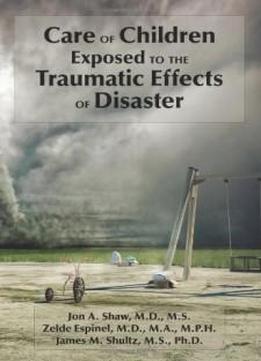
Care Of Children Exposed To The Traumatic Effects Of Disaster
by Jon A. Shaw /
2012 / English / PDF
4.7 MB Download
The psychological consequences of disasters for children are often
slighted in disaster management. Children are uniquely vulnerable,
as they are still maturing physically, emotionally, cognitively,
and socially. Mental health and psychosocial support services are
typically overlooked, delayed, and/or haphazard during response and
recovery efforts. All too often children and families usually have
limited access to mental health treatment services once the
emergency is past. Care of Children Exposed to the Traumatic
Effects of Disaster is designed to provide professional and
volunteer disaster responders, including community members, who
routinely interact with children with the tools they need to
support, intervene, and identify children who need additional help
overcoming the traumatic effects of extreme events. The authors are
experts in psychiatry and public health, and not only understand
the psychological responses to trauma and disaster but know what to
do to mitigate them. The book is eloquently and compassionately
written, and the authors succeed in both communicating their vision
and teaching the practical techniques readers need to realize it.
This is an indispensable book for an unpredictable world.
The psychological consequences of disasters for children are often
slighted in disaster management. Children are uniquely vulnerable,
as they are still maturing physically, emotionally, cognitively,
and socially. Mental health and psychosocial support services are
typically overlooked, delayed, and/or haphazard during response and
recovery efforts. All too often children and families usually have
limited access to mental health treatment services once the
emergency is past. Care of Children Exposed to the Traumatic
Effects of Disaster is designed to provide professional and
volunteer disaster responders, including community members, who
routinely interact with children with the tools they need to
support, intervene, and identify children who need additional help
overcoming the traumatic effects of extreme events. The authors are
experts in psychiatry and public health, and not only understand
the psychological responses to trauma and disaster but know what to
do to mitigate them. The book is eloquently and compassionately
written, and the authors succeed in both communicating their vision
and teaching the practical techniques readers need to realize it.
This is an indispensable book for an unpredictable world.











